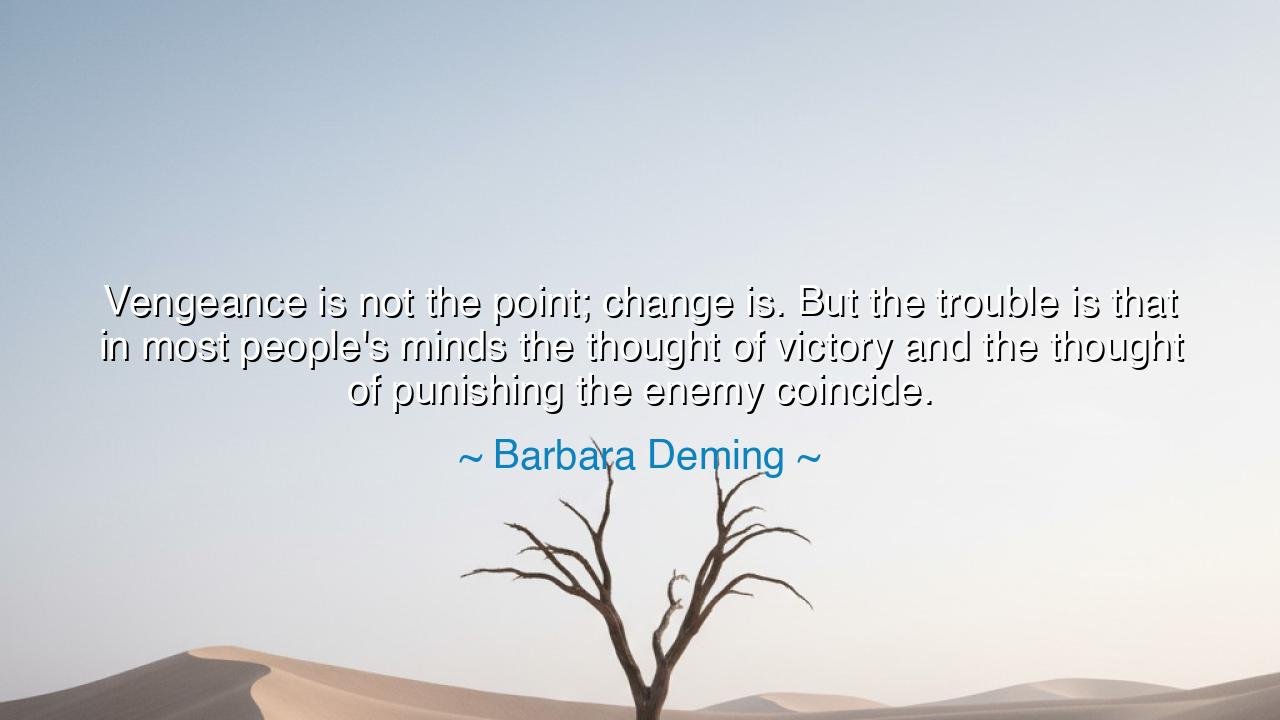
Vengeance is not the point; change is. But the trouble is that in
Vengeance is not the point; change is. But the trouble is that in most people's minds the thought of victory and the thought of punishing the enemy coincide.






Opening Scene
The room is quiet, save for the soft hum of the city outside. The last light of the afternoon filters through the window, casting a peaceful glow. Jack is seated at the table, his hands folded in front of him, lost in thought as he gazes down at the open book before him. Jeeny stands by the window, her arms loosely crossed, her gaze focused on the view below. The air is still, yet there’s a sense of tension, as if the quiet is about to give way to a deeper conversation.
Host: After a long pause, Jeeny speaks, her voice soft but carrying a deeper weight, as though she’s been reflecting on something important.
Jeeny: “You know, I was reading this quote by Barbara Deming recently, and it really struck me. She said, ‘Vengeance is not the point; change is. But the trouble is that in most people's minds the thought of victory and the thought of punishing the enemy coincide.’ It got me thinking — how often do we confuse justice with revenge, and in doing so, lose sight of what truly needs to change?”
Jack: “That’s such a powerful thought. It’s true, though — in many situations, we equate victory with punishing someone. We believe that the only way to achieve change is by making someone pay for what they've done. But Deming’s point is that vengeance isn’t the answer; real change comes when we shift our focus from retribution to transformation.”
Jeeny: “Exactly. When we’re focused on punishment, we get stuck in the past — in what’s been done to us, or what someone else has done. It keeps us rooted in anger and grief, instead of pushing forward toward a solution. But when we focus on change, we start looking at the bigger picture. What needs to be different? How can we create a future where things don’t repeat themselves?”
Jack: “It’s a shift in perspective, isn’t it? Victory becomes less about defeating someone else, and more about creating something better. It’s not about winning over others, but winning over the situation, transforming it into something more constructive.”
Host: The room feels quieter now, the weight of Deming’s words settling between them. Jack leans forward, his eyes thoughtful, clearly processing the deeper implications of the quote. Jeeny walks closer, her voice steady as she continues.
Jeeny: “The tricky part is that we often see the enemy as the obstacle to change, right? We think that by punishing them, we’re making things right, that we’re finally achieving justice. But that’s just a cycle. Vengeance only perpetuates the same negative energy. It doesn’t lead to growth, to healing, to true transformation. True change requires letting go of the need for punishment and focusing on creating a new path forward.”
Jack: “That’s where we get stuck, though — in that emotional response. We’re driven by a need for justice in the form of revenge, because it feels like the only way to heal, the only way to feel like something has been done about the wrong. But real justice comes when we address the underlying issues, when we stop rehashing the past and start working toward something more meaningful, something lasting.”
Jeeny: “And that’s the hard part. It’s easy to want immediate satisfaction, to feel like someone has to pay for what they’ve done. But that’s not the same as making a lasting change. Punishment may provide momentary relief, but healing comes when we focus on progress, on moving forward with intention and purpose.”
Jack: “It’s almost like we’ve been taught that victory equals retribution, that the only way to ‘win’ is to punish those who have hurt us. But in truth, victory comes when we create a system that doesn’t repeat the same mistakes, when we build something better out of the situation.”
Host: The room seems to settle into a deep understanding now, as though the conversation has unlocked a new layer of insight. The world outside continues, but inside, Jack and Jeeny are caught in the realization that the path to true change is not paved with vengeance, but with a commitment to growth, to healing, and to creating a new future.
Jeeny: “So, maybe the key is in focusing on what we can build, not what we can tear down. What if we stopped measuring victory by punishment and instead focused on how we can transform a negative situation into something that moves us forward?”
Jack: “Yes, exactly. Healing is the real victory. When we shift our focus from revenge to transformation, we create opportunities for growth, for change, for renewal. It’s not about defeating someone; it’s about outgrowing the problem.”
Jeeny: “And in that, we move away from the past and create something better. Something more sustainable.”
Host: The conversation deepens in the quiet of the room, leaving behind the realization that true change comes not from revenge or punishment, but from looking forward — from creating solutions and opportunities that transform, heal, and grow. The world continues its rhythm outside, but inside, Jack and Jeeny sit with the understanding that real justice isn’t about retribution. It’s about moving past the hurt, focusing on the future, and creating change that lasts.






AAdministratorAdministrator
Welcome, honored guests. Please leave a comment, we will respond soon